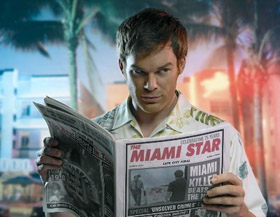Mythology: Dexter
By Martin Felipe
October 12, 2010
BoxOfficeProphets.com

I also argued that the only real difference is that Batman kills with reluctance, often in the process of saving some damsel or other innocent, while Dexter’s acts are cold, calculated and ethically questionable. We know his victims are the lowest of the low, killers themselves. If anyone’s deserving of Dexter’s knife, it’s them.
Yet, the ethical ambiguity lingers. Dexter’s nocturnal antics remain unsettling to watch. If justice is being served at the end of Dexter’s knife, then justice ain’t pretty. I’m sure this is one of the themes the Dexter writers intend - no big revelation there - but I got to thinking about why a Dexter death is so much grimmer than one at the hands of a more traditional hero or superhero figure. I think it’s embedded in not the show’s mythology, but in the Dexter character’s own personal mythology.
You see, if Hollywood has taught me anything about serial killers, it’s that they all have a ritual, and they all kill to achieve some sort of release. What makes Dexter a lovable serial killer is his ritual. We all know it. His foster father Harry helps create it. It’s a personal code involving both choosing the correct targets, and perfectly covering his tracks.
And it seems pretty airtight. Harry, as a cop himself, knows how to fool the police. He also knows about serial killer ritual and, discovering young Dexter’s budding proclivities, instills in him a ritual which both helps to rid Miami of predators and keep Dexter safe from the law.
Yet, like other mythologies, there are rules, and if Dexter breaks these rules, Harry’s code begins to unravel. In most shows, when the audience senses that they aren’t playing by the rules, the backlash kicks in. In the case of Dexter, we watch for those moments that Dexter steps off the Harry path, setting off a chain of events that nearly lead to his downfall. Even the cleverest and most meticulous of serial killers gets sloppy on occasion and Dexter is no different. In fact, his violations of the code in season four have the most tragic consequences yet, the death of his wife Rita.
Which brings me to the other half of the serial killer equation, the release. We want to like Dexter. We want to believe that he follows Harry’s code out of some sense of justice. Yet Dexter claims, over and over, to have no feelings for other humans. When Rita dies, we want him to experience some anguish. Does he? It’s hard to tell. He certainly has some emotional reaction. He kills a man on impulse in a men’s room. The man is an asshole - no question there - but whether he’s killed anyone is up for debate. In any case, Dexter sure doesn’t know. But he needs that release.
So we’re torn. We want him to mourn Rita, but we don’t want him just killing anybody. He must follow the rules of victim selection in order for us to remain in his corner. And that’s just it. There is the sense that Dexter, deep down, doesn’t care who his victims are. Harry trains him, creates his ritual, but what Dexter needs, more than anything, is that release. We want so much to believe that he would never kill an innocent, that he really only wants guilty victims, but this most likely isn’t the case. And the evidence for this is in the final stages of the ritual, the killing itself.
Were Dexter just some killer exterminator and not a monster himself, he wouldn’t need to wait for his victims to awaken before he kills them. He surrounds his death table with images and evidence of what his targets have done to earn their place in his blood slide collection. Then, when they awaken, he verbally taunts them with their sins for a moment before the slaughter. He wants them to know what’s going to happen to them before sinking that knife in their heart.
I suppose one could see this as justice being served. After all, an execution itself isn’t so much the punishment as it is the awareness that the execution is coming. Yet, there is a sadistic, somewhat erotic, glee that Dexter experiences as he toys with the murderers on his table before the climactic knife plunge. It does have a sexual arc to it, a build up then a release - and this is no accident. Dexter’s not doing this out of some altruistic sense of right and wrong. No, he’s getting off on it. While other vigilantes kill with a feeling of “a man’s gotta do what a man’s gotta do,” Dexter does it for pleasure.
And this is what makes Dexter so compelling. We want so much for him to be a cuddly serial killer, protecting Miami from greater evils. Thing is, without Harry’s brilliant code, Dexter would become one of those greater evils. The code, Dexter’s personal mythology, is a brilliant, tight construct, allowing no room for deviation, lest it lead to Dexter’s downfall. It’s the choke collar on a vicious dog, designed to reign in its most undesirable tendencies.
What makes Dexter such a fascinating character is that Harry has created a superhero façade for him to wear. He really has three identities; the charming blood splatter analyst, the vigilante killer of killers, and the true monster under it all, always wanting to run free. And each season, the monster chips away at the code, causing greater and greater destruction to Dexter’s other two identities. Even as Dexter learns love for Rita, Deb and those others around him, his so-called Dark Passenger asserts itself more and more. Yes, this is the difference between Dexter and other vigilante characters like Batman. We want Dexter to be Batman, yet, deep down, we fear that he’s The Joker. And he probably is.